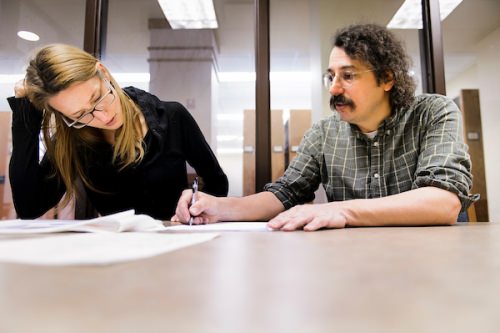How students can get more out of professors’ office hours
Office hours are a time when students and professors get to meet outside of the classroom and form more personal connections. But whether from unexpected hurdles or lack of interest, too many students rarely, if ever, attend office hours.
University of Wisconsin curriculum and instruction assistant professor Rosemary Russ says she is always happy when students come into her office hours — if it happens.
“I think most faculty are really delighted to have people come into office hours, but we rarely ever have them,” Russ says. “I have rarely had students come to my office hours.”
Across the board, professors have said they wish more students would come into their office hours, says Christian Castro, assistant director of Madison Teaching and Learning Excellence. Faculty have told Chris that it’s usually 5 percent, sometimes less, of their students who attend office hours, and it’s the worst in large lectures.
Castro and Russ say one of the biggest reasons for this is that students feel intimidated by faculty members. Students might fear a professor’s reaction if they ask a question, feel too vulnerable when admitting they need help or they might not have a course related question.
But almost all faculty want their students to attend office hours — even if the student doesn’t have a particular question about the course, Castro says. Office hours are a chance for both students and faculty to get to know each other outside of the classroom, which enhances learning and creates personal connections.
“The major thing I would like both students and faculty to know is that office hours aren’t just for talking about the content of the course,” Russ says. “It is an opportunity for this bigger relationship.”
Both students and faculty can make changes to help foster these connections. Here are some tips from Castro and Russ:
Tips for students
Go in pairs or groups. If you have the same question as one of your friends, or just want to have someone by your side when you go to talk to a professor, bring a classmate with you. Professors are happy to talk to more than one student at a time.
Know that you’re not intruding or interrupting anything by going into office hours. Professors do use their office to work during the week, but their office hours are a time that is set aside for you.
“When we say office hours, those are just slots of time that we dedicated for the students,” Castro says. “I’m expecting and hoping that you will come and see me.”
Set up the meeting via email first. This might make it less intimidating than just showing up at a professor’s office cold.

At right, Basil Tikoff, professor of structural geology and tectonics, meets with undergraduate Lisa Haas during Tikoff’s office hours in Weeks Hall for Geological Sciences. Photo: Jeff Miller
If you don’t have a specific question about the class, still feel free to go to office hours. Here are some suggestions for things to talk about:
- How did the professor get to where they are
- Advice about your career path or college courses to take
- How to contextualize course material in a broader context, beyond just the class itself. How does what you’re learning apply to the world beyond the classroom?
- Ask them how to think about the course content in a more holistic way. How does what you’re learning in week one connect to week four, five or six?
- Talk to them if you’re overwhelmed with the course, or with classes in general. They can give you advice.
Professors are people too. Some students may feel like professors are at such a different life stage, that they wouldn’t want to talk to students on a more personal level. But Russ says even though she’s a professor she’s a normal person too. “We’re not scary,” Russ says.
Take professors at their word that they want to talk to you and they want you to come into their office hours.
“You would be surprised to know how many faculty members would love to hear from students just about them as people, as human beings,” Castro says. “It’s so refreshing for a faculty member for a student to come in and say, ‘Hey, I wanted to meet with you because it’s important for me to connect on a more human level with the person that I’m learning from.”
If you don’t think your professor would want to talk to you, ask that professor in class about what he or she is comfortable with during their office hours. Would they want to talk about life in general, or should you stick to questions about the course? Most professors see office hours as an opportunity to have a relationship with their students, not just talk about class.
Tips for professors
Though professors want students to come into their office hours, not many consider changes they could make to help students feel more comfortable, Russ says.
“Not all faculty think about ‘what could I be doing to help students with this,’” Russ says. “We think hey, we’re just regular people, why don’t students just want to come talk with us? But quite clearly that’s not the case.”
Here are some tips from Russ and Castro for encouraging students:
Understand that students might be intimidated by you. Since faculty are typically farther along than students in terms of their career, education, family life or just abilities to pay the bills, students can be intimidated by faculty. And even if you’re not intimidating in any way, when a student asks you for help they’re putting themselves in a vulnerable position. Making efforts to humanize yourself and be open with students can make you more approachable.
Trying calling your office hours “student hours” instead. Castro points out that by using the name office hours, some students think professors are in their office working on something else and students don’t want to interrupt. Castro suggests calling them student hours, something he heard at a UW Madison Teaching Academy event, to make it clear that time is dedicated for students.
Be explicit with students. Let them know that your office hours are time you set away for them and that they aren’t going to be interrupting or intruding. Also be clear that you want to get to know them as people and it’s okay for them to come in if they don’t have questions about the course.
Hold office hours in a public place. Your office can be intimidating for students because it’s your space and not a student’s comfort zone. Holding office hours at one of the unions, outside or a library might make students more comfortable.
Hold Skype or Google chat office hours in the evening. That makes you available at a convenient time for everyone, and providing an option that is not face to face reduces the intimidation barrier for some.
Try out different modes for office hours. In addition to trying new spaces, you could also try giving students the option of meeting you for a walk around campus or getting coffee.
Encourage students to come in groups. Most students don’t think about coming in with a friend as an option. If you tell students they can come in with a friend or hold sessions with 5-7 students, it might eliminate some of the hesitations they have about coming to office hours.
Keep inclusivity in mind. Many students have additional hurdles when coming into office hours, so it’s important to keep those in mind. Minoritized students might face another level of intimidation. Handicapped students might not be able to attend office hours if your office isn’t wheelchair accessible. Castro says it’s important to recognize when students need additional assistance or resources.
“As we think about student hours, we should also be aware of how universal we are being in those office hours,” Castro said.


